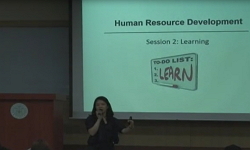This study analyzes the effectiveness of the “Ilmeori Academy,” a practical competency-based educational program at Kyungnam University, designed to foster job-ready graduates in response to corporate demands. The research examines how four core c...
http://chineseinput.net/에서 pinyin(병음)방식으로 중국어를 변환할 수 있습니다.
변환된 중국어를 복사하여 사용하시면 됩니다.
- 中文 을 입력하시려면 zhongwen을 입력하시고 space를누르시면됩니다.
- 北京 을 입력하시려면 beijing을 입력하시고 space를 누르시면 됩니다.

기업 수요 기반 인적자원개발을 위한 대학교 교육 프로그램의 효과성: 경남대학교 일머리 교육을 중심으로 = An Empirical Study on the Effectiveness of University-Based Human Resource Development Aligned with Industry Demands: The Ilmeori Academy at Kyungnam University
한글로보기https://www.riss.kr/link?id=A109763520
- 저자
- 발행기관
- 학술지명
- 권호사항
-
발행연도
2025
-
작성언어
-
- 주제어
-
KDC
300
-
등재정보
KCI등재
-
자료형태
학술저널
-
수록면
105-126(22쪽)
- 제공처
-
0
상세조회 -
0
다운로드
부가정보
다국어 초록 (Multilingual Abstract)
This study analyzes the effectiveness of the “Ilmeori Academy,” a practical competency-based educational program at Kyungnam University, designed to foster job-ready graduates in response to corporate demands. The research examines how four core competencies―personality, communication, collaboration, and problem-solving―affect students’ academic satisfaction and tests the moderating effect of participation in the Ilmeori Academy using hierarchical regression analysis based on survey data. The results show that personality, collaboration, and problem-solving competencies had significant positive effects on academic satisfaction, while communication competency did not. Although participation in the program did not have a direct effect on academic satisfaction, it showed a moderating effect in which students with higher personality or problem-solving competency reported greater academic satisfaction. Conversely, the positive effect of collaboration competency on academic satisfaction was stronger among non-participants. These findings suggest that the Ilmeori Academy plays a conditional role in translating student competencies into academic outcomes. The study contributes theoretically by empirically validating the moderating role of practical training in the relationship between core competencies and academic satisfaction, and it offers practical implications for designing differentiated, competency-based programs aligned with industry needs.
동일학술지(권/호) 다른 논문
-
기업의 지속가능경영에 대한 성과관리: 균형성과표(BSC)에서 지속가능 균형성과표(SBSC)로
- 경남대학교 산업경영연구소
- 백윤정 ( Baek Yoonjung )
- 2025
- KCI등재
-
- 경남대학교 산업경영연구소
- 윤선주 ( Yoon Seon-ju )
- 2025
- KCI등재
-
산업 분쟁에서의 국제 중재 판정 연구 : 미국의 승인·집행과 불편한 법정의 법리를 중심으로
- 경남대학교 산업경영연구소
- 허윤석 ( Hur Yun-seok )
- 2025
- KCI등재
-
정의 관점의 환경·사회·지배구조(ESG)경영 패러다임과 사례 연구
- 경남대학교 산업경영연구소
- 이갑두 ( Lee Gab-doo )
- 2025
- KCI등재




 KISS
KISS






